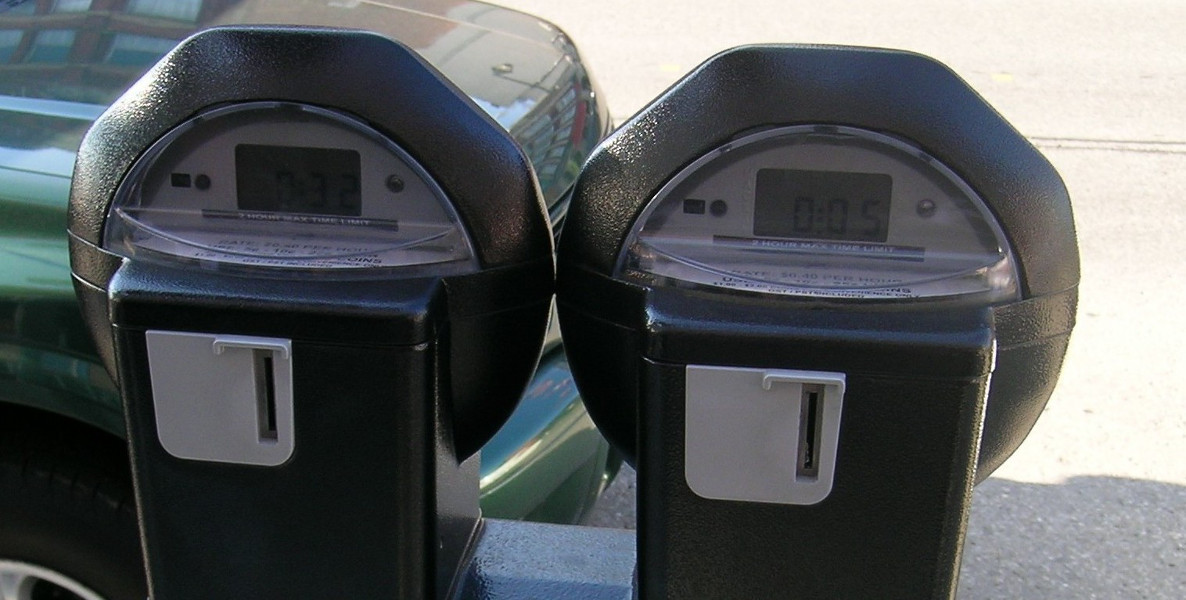UPDATE: Since this story ran in April, the Philadelphia Parking Authority announced that it has struck a deal with Pango, a mobile parking app that will allow Philly drivers to pay for on-street parking via their cell phones; send them a text message when their time is about to run out; and allow them to add time to their meter from wherever they are. The program was supposed to launch in late July, despite concerns from Mayor Nutter that fewer parking tickets would mean less revenue for schools. Now it’s scheduled to begin as a six-month pilot in and around Center City in mid-October, after which it will hopefully extend to the entire city. Meanwhile, Mayor Nutter’s administration released data on each of the 4.9 million tickets issued since 2012—most of them in Center City.
Los Angeles Senior Transportation Engineer Ken Husting—the guy in charge of the city’s parking signs—was on his way to brunch with his wife one morning in December, 2013, when he pulled his car into what seemed to be a perfectly good parking spot. Or maybe it wasn’t. Wait, was it? By the time Husting got to the sixth sign on the parking pole, even he was confused.
“The parking signs were extremely complicated—even for me,” says Husting. “I thought, ‘There’s got to be a better way.’”
So Husting set out to make Los Angeles the first city in the country with parking signs that actually make sense. And he may have succeeded—with the help of a Brooklyn artist.
In early 2014, Husting set his 40 employees at the LA Department of Transportation to the task of finding a new way to make parking signs. They came across the work of Brooklyn artist Nikki Sylianteng, who had created—and hung—her own parking signs in her neighborhood using simple red and green color blocks to indicate when drivers were allowed to park their cars in a spot. After hanging paper printouts of her new signs, Sylianteng garnered national news, praise from her neighbors and a call from Husting’s team.
A year later, a modified version of Sylianteng’s parking signs are starting to go up on two busy streets in downtown L.A., as part of a pilot project to determine if they make finding a legal spot less confusing. Over the next six months, Husting says LADOT will evaluate the signs’ success through an online survey and by reviewing the number of citations issued and revenue generated on those blocks: Fewer parking tickets and higher meter revenues would mean drivers are finding it easier to understand the rules. Each of Husting’s new signs—of which there are 27 different variations—is also going up with a bluetooth transmitter that could one day send messages to drivers (or their cars) about whether or not they can park in a spot. He says the city’s innovation and technology chief is working with local developers to create the apps needed to make the transmitters functional.
![]() “We don’t want people’s first experience—or even repeat experience—to be getting a citation in L.A.,” Husting says. “We hope this improves the parking experience in Los Angeles, so people go downtown for shopping, eating, entertainment.”
“We don’t want people’s first experience—or even repeat experience—to be getting a citation in L.A.,” Husting says. “We hope this improves the parking experience in Los Angeles, so people go downtown for shopping, eating, entertainment.”
Even if the pilot is successful, Angelenos won’t immediately see all new parking signs. As in Pennsylvania, the California Manual of Uniform Traffic Control Devices mandates the sorts of signs every town and street in the state must use. But Husting says LADOT plans to petition the state to include his signs as a parking option. If he succeeds, it will be the first time a major city has managed to make parking easier, not harder, for its citizens. (And make a lie out of the understandable belief that parking signs are intentionally confusing, in order to generate money.)
“We’ve been looking all over, thinking we can’t be the only ones who are dealing with this,” says Husting. “But we can’t find anyone else—we think we’re the first city to do something like this.”
Would it work here? Not likely. Philadelphia Parking Authority spokesman Martin O’Rourke says the state’s uniform traffic devices code “hinders their ability to design something unique to Philadelphia.” No trailblazers like Husting here. For now we can only hope that if Husting succeeds in California, Pennsylvania will one day follow suit. Or we stick to what Husting did on a recent trip to Philadelphia: Walk everywhere.
This originally ran on The Citizen on 4.20.15
Head photo: WikiCommons




